PROVIDENCE, R.I. -- Digit Murphy motions to follow her, down the stairs, around the corner, past a row of portraits. Her own -- face a little younger, hair a little longer -- hangs in the center. Three to the left; three to the right. She points at the pictures.
American coach on mission to help grow women's hockey in China
After 22 seasons at Brown University, Murphy takes on new challenge overseas
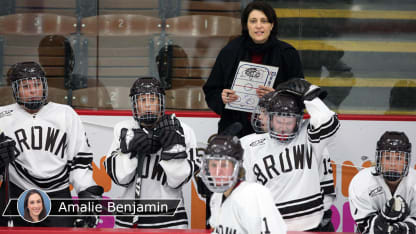
"See," Murphy says. "Only woman on the wall. That's what I did for women's sports."
She is not done pointing. Her black loafers whisk her past the paintings and up into the stands in the building that she called home for 22 seasons, where she raised her six kids, and so many more that were not, technically, hers.
She points to the banners that line the ceiling at Meehan Auditorium, the hockey rink on the campus of Brown University.
"That's what I did," she says again.
This building, this team, is her past, though, as she returns in mid-October for a clash between her old life and a life she could not exactly have imagined when she stalked the halls and the rink of Brown, energy and passion always on display.
She had made her career pushing women forward in sports, creating opportunities. She was the longtime coach at Brown, where she went 318-244-57 and her teams played for the national championship three times, winning five Ivy League titles. She left Brown in 2011 and went on to coach the Boston Blades of the Canadian Women's Hockey League, taking the regular-season title and Clarkson Cup in 2012-13.
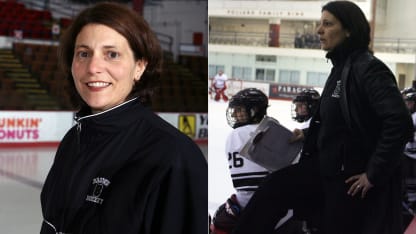
In her new job, she has gone far afield, leaving her kids behind, her country behind, burnishing her legacy on the next frontier in hockey, in women's sports.
It is, she reflects, what she has always done. Just, now, in Chinese.
\\\\
There is a problem. Murphy chatters into a cell phone, doing her best to fix an issue that it's not clear she can solve. The wrong credit card has been charged. Everyone in China is sleeping. It is unknown if her team -- the Kunlun Red Star, one of two new China-based franchises in the CWHL -- will have the buses it needs.
She apologizes. "It's crazy right now," she says.
This is life, sometimes, for Murphy and the Red Star. She is the coach and general manager, and oversees a group of four other teams, including the Vanke Rays of the CWHL. This is life in an emerging sport in an emerging market. Things do not always go as planned. There are growing pains and learning curves.
But the payoff? That's the allure.
The point of all this is simple: To grow women's hockey in China, the great untapped market, and to create more opportunities for more women's hockey players, in multiple countries. The point of all this is not so simple: To drive toward the 2022 Beijing Olympics, to put China in position to possibly medal in women's hockey.
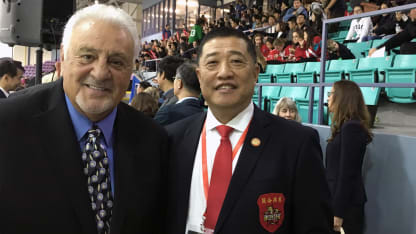
"It can happen," Murphy insists. "It totally can happen. Think about it: No one thought it could happen (when the United States men won gold) in 1980, no one ever would have thought. If there's a hot goalie and there's a magical moment and all the stars and moon align, of course it can happen.
"If you think it can't happen it won't. But if you think it can happen, there's a possibility and potential and it will."
That's part of why the Red Star were created, along with the other teams under the same umbrella: the Kunlun Red Star men's team, which plays in the Kontinental Hockey League; and the Vanke Rays, who, like the women's Red Star team, play as an expansion team in the CWHL, despite being based halfway around the world from their opposition.
That will necessitate weeks-long road trips for the Red Star and Rays to the United States and Canada, and four-game road trips for the rest of the teams to China during the season, a difficult task given that the CWHL is not the only job for most of its athletes.
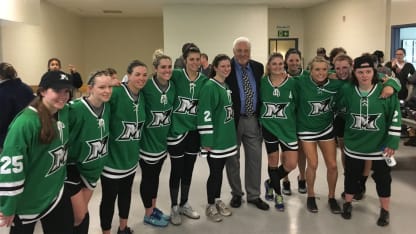
The teams are a mix of international players like American forward Kelli Stack and Finnish goaltender Noora Raty; North American players of Chinese descent; and Chinese nationals like Zhixin Liu, a promising defenseman who had quit the game before Murphy and her staff convinced her to return. As Murphy said, "Now she's a star."
To get her there hasn't been easy. None of this is easy. Easy is not what Murphy goes for.
\\\\
Murphy laughs when she's asked the million-dollar question: Why?
"Why did I do this?" she says. "No. 1, anytime China wants to get in a market, I'm listening. That's No. 1. No. 2, to be able to leave another legacy and to do it globally is very interesting to me and rewarding and to be able to fulfill my passion of creating women's opportunities, that's why I did it."
That was what lured her to Shenzen, China, a city located just north of Hong Kong, where both iterations of the Red Star are based, with the men's team led by Stanley Cup-winning coach Mike Keenan. There were resources and there was passion and they were both being flung into the space of women's athletics. That will always make Murphy perk up and listen.
She had been approached by Scott MacPherson, a longtime friend and longtime hockey executive who works with the KHL. When Murphy was at Brown, they had spent many a night over coffee at Venda Ravioli in Providence, contemplating what was and what could be in women's hockey.
"Digit was a natural," MacPherson said. "I had already interviewed her for the job 10 years before. I knew her competitive instincts, I knew her experience level, her knowledge of the game and her work ethic. So for me there was no other person interviewed, there was no other choice.
"She truly is the right person to lead the charge."
She was the one he wanted when the opportunity came up, to be the coach of the Red Star and the general managers of five teams within its orbit. She was the right person for the right job, even if the match raised some eyebrows.
"When my mom told me she was going to China, I laughed," Meaghan Murphy said.
But she knew that, generally, when her mother says she's going to do something, she does it, whether it was helping to start the United Women's Lacrosse League, or going to China to coach and manage.
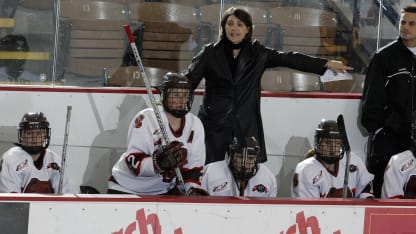
This, after all, is what she believes she's built for, this kind of scenario, even if it means leaving behind her close-knit family for long stretches, weeks and months on the other side of the world, six or seven times already this year.
This is a new experiment in China, yes. But this is something that Murphy has done before, stepping into the forefront and pushing forward.
"I've already been there," said Murphy, 55. "I was there when I came to Brown. I was there in 1972 when Title IX said girls could play. So for me it's just more of the same. It's what I was put on the planet to do. … I guess I have to keep doing this until there's no more [new] frontiers, that's all I can say."
\\\\
The job has not only been to coach, of course. It has been to work through the logistics of setting up teams in a sport that effectively didn't exist in China until recent years. There is little infrastructure for such a move and, as Murphy said, that has made it chaotic at times. It has taught her plenty.
"I think one of the things with Digit in the last six months, she's learned a lot about herself," MacPherson said. "She's learned a lot about patience, diplomacy. These are all things that I think weren't part of her toolbox last February (when she took the job), and they're all things that -- she's obviously a survivor, she's obviously very intelligent -- she's learned very quickly what she needs to do to be successful not just with our hockey team, but with growing hockey in a market that nobody knows the sport."
The basic premise is that the Red Star and Rays will help create a scenario in which China will not just have the automatic bid to the 2022 Olympics in Beijing in women's hockey. The idea is that China will legitimately compete, that it will have a chance to be among the best of the best, even though the country stands at No. 18 in the IIHF women's world rankings, between Kazakhstan and Italy.
That is what they're all hoping for, all dreaming on.
"I've played for an Olympic medal twice and, in a way, this means more to me than playing on that stage," said Stack, the American in China. "Having an impact for another program and another country to help build theirs is more meaningful than any award or silver, gold, bronze medal for myself and for Team USA. If I can help their country place or come in the top four in Beijing 2022, then for the rest of my life that's all I'll talk about."
Eventually the North American Chinese players and the Chinese nationals will become the Chinese Olympic team, will take the skills they have learned playing in the CWHL and translate them onto the greater stage. They will -- so the hope goes -- have learned from players like Stack and Raty, who are sport ambassadors as well as players, a dual role that allows them to be paid more than the average CWHL player.
As Murphy explained it, "It's like having 10 extra coaches on each team with the idea that the talent level will go up faster. … This is like coaching on steroids because you're really trying to up the game quicker."
Which is important, because they're starting from scratch.
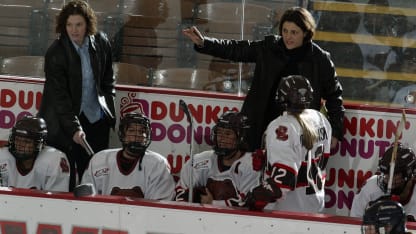
"We're educating: how to eat, how to eat the right foods, how to sleep, how to hydrate, all this stuff we take for granted," said Murphy, who knows a bit of Chinese but is using demonstrations, video and interpreters to aid in her coaching. "How to train, how to weightlift, they don't know how to do that. So it's really, really cool. It's so rewarding to be part of this initiative."
It's why the Chinese business behind the teams, also named Kunlun Red Star, has been able to attract the names it has, from Keenan to Hockey Hall of Famer Phil Esposito to former NHL forward Bobby Carpenter to, yes, Murphy. (Esposito and Carpenter are on the Red Star international advisory board.)
"These are legends," MacPherson said. "What they're going to do is we're going to try and create a Wayne Gretzky, a Phil Esposito, a Mike Keenan, a Digit Murphy, so at some point they're Chinese."
That will be how success is measured, whether they can -- at some point -- hand this whole grand experiment back to the Chinese, put it in their hands, and watch it seamlessly succeed.
"If anyone's going to do it," said Rob Morgan, coach of the Vanke Rays, "it's going to be Digit."

\\\\
The tears start falling early on, not long before the players take the ice for warmups: Brown and Kunlun. Old and new. Then and now. Murphy seems resigned to the tears. She figured this would happen, even as she fought against it. She's back in her place, at Brown, looking back on a part of her life that has ended.
"It's the kids," she says. "It's not even my players -- it's my kids."
She pauses, eyes spilling over.
"I promised I wasn't going to do this," she says. "You got me. I'm Italian, I can't help it. But, no, it's just something that it's very cool, and these are tears of joy."
There is vindication in the evening, as her new team shuts out her old team in a resounding victory that matters, even though it's only an exhibition. She is not the same person she was at Brown, not the same coach. Where once, as Meaghan Murphy points out, she would skate her players "until they puked," there is now a softer approach, a more open-minded style that fits with the different population that she now coaches.
It might not work every night, in every situation, but it has worked tonight. She has beaten back her past and celebrated with her future.
She ends the night surrounded by her team, both the one on the ice and the one in the rest of her life, her partner, her kids, her people. She will be in the United States for another month and then it's off to China, back to the place that she is trying to embrace, trying to teach, trying to bring to the highest heights --- five years to a medal.
It is unbelievable, even as she makes you believe in the possibility.
"When you say, 'Why?' I always say, 'Why not?'" Murphy said. "Like, why not do this?"
It's why she was hired. It's why she just might pull this off.

















